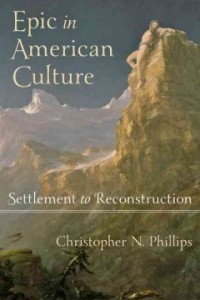Epic
The Course of Epic in American Culture: From Settlement to Reconstruction
Published 2012 from The Johns Hopkins University Press—hardcover and e-book formats
This project is a literary history that expanded into a cultural history of the ways in which American writers and artists engaged with the epic, seen through much of colonial and national U.S. history as the most prestigious of all literary forms. Dozens of texts used and adapted conventions, styles, and allusions from the works of Homer, Virgil, Milton, and other canonical forebears, but I found that very few of those texts claimed epic status for themselves. In fact, a number of them—from Timothy Dwight’s Conquest of Canaan (1785) to Walt Whitman’s Leaves of Grass (1855)—actually asserted that they were not epic, but something else.
This love-hate relationship with epic form extended to the visual arts, constitutional law, and even music, even as writers and readers alike sought to define epic in encyclopedic terms that would help to at last define the nation, or their time, or themselves. Epic did not die out with the rise of modernity, as many critics have argued; rather, it helped to give modernity its meaning, and in so doing permeated American culture to the point of invisibility. What many have mistaken for the death of epic is actually its success in achieving cultural ubiquity.
A few highlights of the project:
• Considers the importance of translation in the development of epic in the New World
• Re-examines the Connecticut Wits’ epic works in light of the manuscript and oratorical versions that evolved into surprisingly ephemeral epic poems
• Recovers little-known works by authors such as Richard Snowden (an 18th c. New Jersey Quaker) and Thomas Branagan (an early Philadelphia abolitionist), as well as offering a new reading of Henry W. Longfellow as an epic poet
• Presents the first critical study of “epic” as a term in constitutional law or in art criticism, where it had profound yet historically specific power in the early years of the U.S.
• Incorporates new evidence of Melville’s sources for Moby-Dick to examine the centrality of ekphrastic devices to the book’s intellectual project
Early versions of portions of this manuscript have been published as:
“Lighting Out for the Rough Ground: America’s Epic Origins and the Richness of World Literature,” PMLA 122.5 (October 2007)
“Epic, Anti-Eloquence, and Abolitionism: Thomas Branagan’s Avenia and The Penitential Tyrant,” Early American Literature 44.3 (Winter 2009)
“Fragmenting the Bard: Sarah Wentworth Morton’s Intertextual Epic,” Literature in the Early American Republic 4 (2012)
MEDIA COVERAGE
Web article from Lafayette College on the book
REVIEWS
The book has been reviewed favorably in Choice, November 2012 (no link available)
